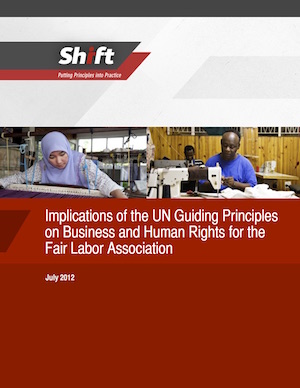Also see: Overview of our work with financial institutions on implementation of the Guiding Principles | Our report on the cost of corporate-community conflict
From 2012-2015, Shift was pleased to support the Superintendency of Banks, Insurers and Private Pension Funds (SBS) in Peru in the development and implementation of a new regulation to strengthen due diligence in the Peruvian financial sector. The regulation is available in Spanish (official) and English (unofficial) here.
Shift provided advisory support to the SBS regarding the development of a new regulation aimed at mitigating social conflict related to large investment projects in Peru. This initiative responded to the evidence that such conflict can increase credit risk and reduce the creditworthiness of projects and/or their primary suppliers that are directly or indirectly affected by social conflicts. | Jump to our report on the cost of conflict in the extractives sector
In recent years there has been considerable social conflict in Peru around major commercial projects, particularly in the extractive industries and forestry. This has in part resulted from local communities’ concerns about the impacts these projects may have on their livelihoods, welfare and human rights. These conflicts are seen to have implications for the credit risk of individual Peruvian banks, the stability of the Peruvian financial system, and the reputation of Peru as an investment location.
Shift worked with the SBS to look at how the elements of due diligence set out in the Guiding Principles could provide a useful reference point for the planned regulation. This advice focused on the role of effective community dialogue and engagement and grievance handling processes in ensuring that due diligence processes are effective in mitigating risks of social conflict.
The SBS has now issued the new regulation, which requires banks to pursue social and environmental risk management in relation to certain advisory services and loans for particular projects in Peru, including natural resource extraction projects. While the new regulation is framed in terms of social and environmental due diligence in general and emphasizes reduction of systemic risk, its greatest innovation lies in the human rights lens it brings to the requirements of banks, and in turn of their clients, including the assessment of the quality of client companies’ processes for engaging directly with potentially impacted communities and providing channels for them to raise grievances. In this regard, it reflects important features of human rights due diligence emphasized in the Guiding Principles.
During the development of the regulation, Shift was pleased to provide additional support to the SBS including delivering collaborative capacity building workshops for key SBS staff, joint with the Association of Banking Supervisors of the Americas (ASBA), as well as training for representatives from Peruvian banks that are subject to the new regulation.
